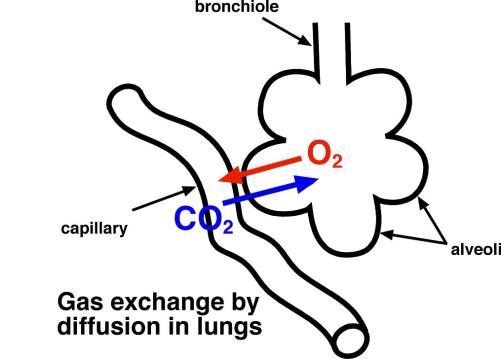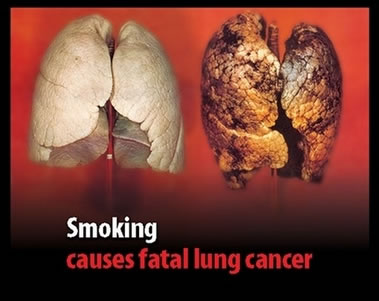The Lungs
The lungs are the most essential organ when it comes to respiration. The lung’s primary function is to transport oxygen from the general atmosphere, into the blood stream and then throughout the different areas of the body. It is also the role of the lungs to then remove any carbon dioxide from the blood stream and then release it back into the atmosphere. The lungs are a pair of sponge-like organs and are found in the thoracic cavity, almost filling it. They have many folds which increase the surface area for gas exchange and your left lung is slightly smaller than your right lung. This is so that there is space in the thoracic cavity for your heart.
The left lung is divided into two ‘lobes’ whilst the right lung is divided into three ‘lobes’.

 The alveoli give the lungs an expansive surface area for gas exchange. The surface area of the lungs is so huge that if you were to lay all airways and air sacs of a person’s lungs, flat onto the ground, the surface area would cover an entire tennis court – more than 100 square yards.
The alveoli give the lungs an expansive surface area for gas exchange. The surface area of the lungs is so huge that if you were to lay all airways and air sacs of a person’s lungs, flat onto the ground, the surface area would cover an entire tennis court – more than 100 square yards. The alveoli are the most important part of our lungs as it is through them that all of the gasses diffuse in and out of your lungs into or out of your blood stream. This is possible as the alveoli are totally covered and ‘bathed’ in millions of minute blood capillaries. The alveoli allow for an efficient of exchange of oxygen into the blood stream and carbon dioxide out of the blood stream and back into the lungs ready to be exhaled back into the atmosphere.
Obviously the lungs are the pushing power that allows for respiration. The air we breathe in travels down our trachea (windpipe), into the lungs through the two bronchus and the oxygen from this is then dispersed into the blood stream with thanks to the alveoli. With each breath we take, the lungs draw in oxygen and remove carbon dioxide.
The alveoli have a very thin membrane which allows for the exchange of gases but if this membrane thickens or is damaged even slightly, the vital gas exchange becomes much less efficient. The more of a person’s alveoli that become damaged like this the higher the chance of said person suffering from breathlessness.

This would be a huge problem to a performer as a lack in the proficiency of the gas exchange can lead to breathlessness which would have a detrimental effect upon projection. The person may also begin to suffer with fatigue which can easily lead to problems such as fainting, which is not only dangerous for the sufferer but to the people around them when performing as fainting can easily cause accidents and injury. A person’s articulation may also become affected as fatigue can lead to a loss of focus and an increase in sloppiness. It is very important for me to have an understanding of how our lungs affect our voice in order for me to learn the importance and look after them in the aim to increase our breath control and vocal technique.
 There are a numerous amount of diseases that can affect the health of our lungs and hinder our performance, for this reason it is very important for us to try our hardest to keep our lungs as healthy as possible. Some of the diseases that affect lung health include:
There are a numerous amount of diseases that can affect the health of our lungs and hinder our performance, for this reason it is very important for us to try our hardest to keep our lungs as healthy as possible. Some of the diseases that affect lung health include: * Lung Cancer
* Asbestosis
* COPD (chronic obstructive pulmonary disease)
* Pneumonia
* Pleural cavity diseases
* Pulmonary vascular diseases
* Pulmonary Oedema
* Pulmonary tuberculosis
* Asthma
* Bronchitis
As well as the lungs being the main organ necessary for respiration, they actually also act as one of the body’s defences against infection and harmful bacteria. Despite the fact that the nose is the primary line of defence against harmful materials that are inhaled, the lungs count as the secondary line of defence, any harmful inhaled particles, such as smoke and pollution, and infectious agents, such as many viruses and bacteria, pass through our nose or mouth and proceed to lodge in the lungs.
The lungs produce a sticky substance called mucous and it is this fluid that can trap these inhaled materials and therefore aid the lungs’ white blood cells in the process of destroying these harmful agents and bacteria. It is suggested to cough as a good way to clear mucus from the lungs but these agents can be brough up the airways ready to be either swallowed of coughed out by cilia. The larger airways of our respiration system are covered with tiny cells that are almost hair-like called cilia.
These cells beat and it is their beating with a fast rhythm that allows the mucus and cells to be propelled up the airways to be coughed out or swallowed. It is often found that, in smokers, the cilia have been either killed or become inactive which allows thick mucus to accumulate resulting in an inefficient lung defence.
It is very important for performers to have as large a lung capacity as possible in order to enhance their vocal capacity through way of breath. There are factors that can serious affect and diminish your lung capacity. For example, if you smoke or suffer from lung disease your lung capacity is decreased. For performers, a decreased lung capacity can result in an incline of difficulty of holding a note for a long time (singing) or struggle with pronunciation and articulation due to a struggle to create the necessary glottal onset of vowels. I, personally am a smoker and therefore need to realise the damage smoking causes to my vocal health. Through way of research and disturbing pictures as above I hope to try and quit as i know that it is vital for a performer to have a healthy, working body in order to be the best that we can be.


No comments:
Post a Comment